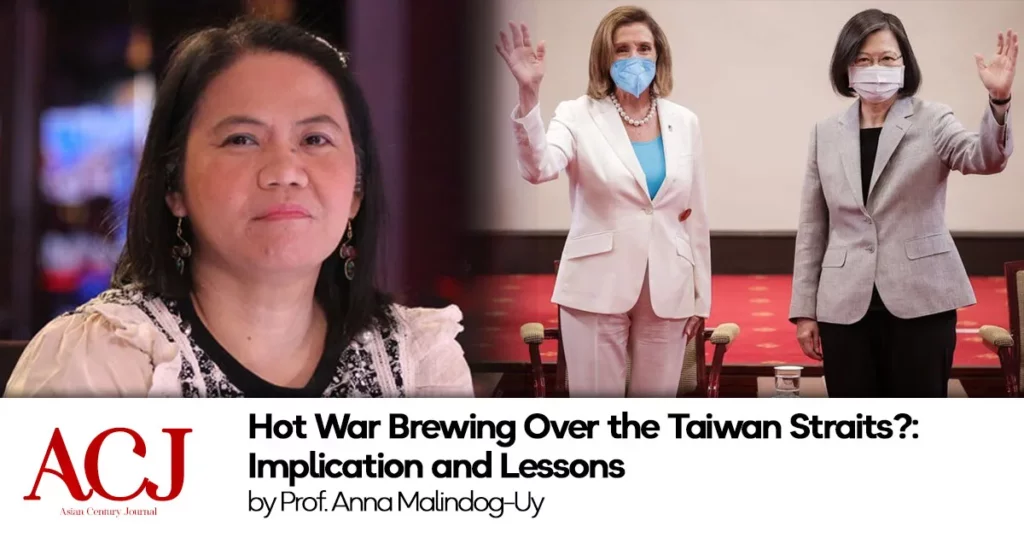
The Taiwan Strait is thus far one of the most sensitive issues for China-US relations. The rising tensions, the brewing hot war atmosphere between China and the United States, and the potential military confrontation between the two superpowers seem almost inevitable. The saber-rattling in the Taiwan Strait has been triggered by the recent visit to Taiwan by the Speaker of the US House of Representatives Nancy Pelosi last 2 August 2022, despite the strong and serious opposition from the Chinese government and the Chinese people.
As a defensive posture, China of course has protested and is very much opposed to such official interactions between the US and Taiwan for it undermines China’s sovereignty and territorial integrity. The recent visit of Pelosi to Taiwan was indeed a glaring and deep-seated irritant, a strong provocation akin to the “salami strategy” (divide and conquer) on the part of the US. The Pelosi visit to Taiwan has no doubt amplified the brewing feverish atmosphere and volatile situation in the Taiwan Strait.
As expected, China did not and will not sit idly while its sovereign and territorial integrity is being undermined and challenged by the United States and the likes of Pelosi. The Taiwan issue is one of the red flags of China and I guess the whole world knows that. The impertinence, hubris, and arrogance of Pelosi to even set foot in Taiwan despite strong opposition from the Chinese government and the Chinese people is but an epitome of US disregard and disrespect for other countries’ sovereignty as long as it is favorable and suits their hegemonic interests. This is a classic US imperialism and exceptionalism that the world has had to contend with since time immemorial.
One-China Principle
As far as the People’s Republic of China (PRC) is concerned, the visit of Pelosi is a is a serious violation of the One-China Principle and the provisions of the three China-U.S. joint communiqués. Accordingly, the visit of Pelosi has a severe impact on the political foundation of China-U.S. relations and seriously infringes upon China’s sovereignty and territorial integrity. It gravely undermines peace and stability across the Taiwan Strait, and sends a seriously wrong signal to the separatist forces for “Taiwan independence”. China firmly opposes and sternly condemns this, and has made serious démarche and strong protests against the United States.
To note, the One-China principle, a position held by the PRC that there is only one sovereign state under the name China, with the People’s Republic of China (PRC) serving as the sole legitimate government of that China, and Taiwan is a part of China, is a basic norm governing international relations, one of the bedrocks of international law, and an integral part of the post-Second World War international order.
In international relations, a state or country is only sovereign if it has a permanent population, defined territory, one government, and most of all recognized by other states with the capacity to enter into relations with other sovereign states. Thus far, Taiwan is not a country nor a sovereign state in this regard.
The One-China principle fundamentally declares that Taiwan is a territory of the PRC. This is recognized by 181 countries including the US. While Taiwan’s so-called “independence” is recognized by less than two dozen countries across the globe. Hence, the PRC has been recognized by the United Nations and across the world as the sole legal government representing the entire Chinese people.
Based on international law, a sovereign state can only be represented by a single central government. As a part of China, though, the PRC has not objected to non-governmental economic or cultural exchanges between Taiwan and foreign countries, Taiwan has no right to represent China in the international community. It has no right to establish diplomatic ties or enter into relations of an official nature with foreign countries. This is the fact of the matter. The international community including the US has acknowledged the fact that Taiwan belongs to China.
To note, the Cairo Declaration issued by China, the United States, and Great Britain on 1 December 1943 stated: “It is the purpose of the three great Allies that Japan shall be stripped of all the islands in the Pacific which she has seized or occupied since the beginning of the First World War in 1914, and that all the territories Japan has stolen from the Chinese, such as Manchuria, Formosa [Taiwan] and the Pescadores [Penghu], shall be restored to China.” The Potsdam Proclamation signed by China, the United States, and Great Britain on 26 July 1945 (subsequently adhered to by the Soviet Union) reiterated: “The terms of the Cairo Declaration shall be carried out.”
On 25 October 1945, the ceremony for accepting Japan’s surrender in Taiwan Province of the China war theater of the Allied powers was held in Taibei. On the occasion, the chief officer for accepting the surrender proclaimed on behalf of the Chinese government that from that day forward Taiwan and the Penghu Archipelago had again been incorporated formally into the territory of China and that the territory, people, and administration had now been placed under the sovereignty of China. From that point in time forward, Taiwan and Penghu had been put back under the jurisdiction of Chinese sovereignty.
Implications
On another note, amid the rising tension between the US and China over the Taiwan Strait, what are its implications, and how countries like the Philippines will be affected given that the Philippines is a treaty ally of the US?
My initial thoughts on this are that if anything untoward happens in the Taiwan Straits, the Philippines will be dragged. Take note that there are five (5) EDCA/US bases the country is hosting across the country at the moment, namely Subic Bay Naval Base, Basa Air Base, Fort Magsaysay, Antonio Bautista Air Base, Mactan-Benito Ebuen Air Base, and Lumbia Air Base, which are located for US purposes. They’re near or on the SCS, significantly enhancing the US military’s ability to challenge Beijing there. The Americans have boots on the ground too and military facilities because of Enhanced Defense Cooperation Agreement (EDCA).
If in any case the Philippines will be used as a launching pad by the US to defend Taiwan in any eventuality like a military confrontation between the US and PLA forces in whatever magnitude and scale, then eventually, the country will suffer the fate of Ukraine. This is the buzz the country has to ponder on and think through. The way I see it, PLA’s mobilization in the Eastern Theater is NOT merely a show of force. It’s a preparation.
Thus, the Philippines as a country must NOT get involved and probably reconsider the Visiting Forces Agreement (VFA), EDCA, the Mutual Defense Treaty (MDT), and the alleged forward military bases of the Australians in Zamboanga as reported by an article published on the Mindanao Cross on 23 April 2022 and republished on MaritimeNews on 4 May 2022 entitled “Say No to Foreign Military Base In Mindanao” by Yonax Gutierrez narrates the opposition of the Ranao Youth Council saying that it did not want the Bangsamoro Autonomous Region in Muslim Mindanao (BARM) to “end up the host” to the convergence of the foreign military bases. The said article further indicated that based on news reports, the Australian military intelligence unit already put up a military forward base inside the Zamboanga Philippine military camp with the assistance of the Philippine counterpart. Moro peace advocates urged the Bangsamoro government to be vigilant of the existence of foreign troops in Mindanao.
As a country, the Philippines needs a genuine and authentic independent foreign policy in every sense and that would mean complete neutrality and positioning itself as non-aligned. This means “rejecting outright alignment with the US. In doing so, time is of the essence.
Abrogating the MDT, EDCA and the VFA is like a liberation for the Philippines from the indirect control and its subservience or the state of being submissive to the US, especially in military aspects.
The original rationale behind the crafting of the MDT was to guard against a rearmed Japan after World War II, with the Soviet Union as the convenient secondary threat because of the Cold War. But such threats are gone now. China is not a threat to the Philippines but a friend and a brother to Filipinos. The Philippines has historical ties and deepening friendship and mutual understanding with China. China is the country’s closest and strongest partner economically and strategically speaking.
Also, China’s fundamental military doctrine and principles won’t allow it to attack any country unless attacked first. China will not attack the Philippines despite differences over the SCS and whatever eventuality in the Taiwan Strait. But if the Philippines is used as a launchpad to attack China militarily, that’s a different story altogether. Of course, China will retaliate and that will be most unfortunate.
The Philippines has no enemies and should not create one at all costs. Thus, no need to choose a side. Our relations with each country should be based on our national interests and should be based on what’s good for the country and not for the benefit of other countries at our expense. The Philippines is a friend of China and the US. US enemies or adversaries are not the country’s enemies/adversaries and this must be emphasized by the current administration under the leadership of President Ferdinand Marcos Jr. As a country we should uphold our national interests and be dragged into any conflict, not our own making is I guess not part of our national interests.
Moreover, the existing PH-US MDT, EDCA, and the VFA have a lot of infirmities, lopsided and skewed provisions favorable more to the US than to the Philippines that need to be revisited and reassessed.
More importantly, maintaining the VFA, EDCA, or even the MDT in its original texts is an anti-thesis in the pursuit of a genuine independent foreign policy and non-aligned stance of the country. The Philippines must pursue an independent foreign policy that upholds and prioritizes its national interests and not those of other countries.
Conclusion
Indeed, the recent visit of Pelosi to Taiwan has no doubt put the Taiwan Strait in a new round of tensions and severe challenges, and the underlying reason is the reckless, irresponsible, and provocative adventurism not only of Pelosi and her cohorts but even of the US and Taiwan authorities. Such an irresponsible move on the part of Pelosi, the Taiwan authorities, and the US deserves condemnation for it puts the whole world on a brink of another world war.
The rising tension between the US and China due to Pelosi’s visit to Taiwan despite China’s expressed strong opposition is a provocation vis-à-vis China in the strongest sense. The visit of Pelosi to Taiwan has challenged the bottom line and the red line of China while undermining China’s sovereignty and territorial integrity over Taiwan, a regened province of China. This heedless move on the part of Pelosi has changed the trajectory and the atmosphere of the Taiwan Strait affecting regional countries like the Philippines geopolitically speaking.
The recent visit of Pelosi to China is an emblem of disrespect and disregard for the principles of mutual respect for sovereignty and territorial integrity and non-interference in each country’s internal affairs and a breach of the norms of international relations/law and interference in China’s internal affairs. This is a glaring fact.
But thank goodness, China is a responsible superpower and did not take the bait of the US. Rather it exercised strong restraint, self-control, and self-discipline. China responded to the provocative visit of Pelosi to Taiwan in a more targeted and calculated manner despite the surmountable pressures that did not end up in World War III.
Such action on the part of China is indeed commendable and is worthy of applause. It only goes to show that China is a responsible superpower that exercised strong restraint and took into consideration the plight of regional countries like the Philippines, a country that surely will be affected if a military confrontation breaks out in the Taiwan Strait between itself and the US. This only goes to show that China puts premium and importance on peace and stability of the Indo/Asia Pacific region even though it faced surmountable pressure and was baited to respond militarily. This is a classic display of “grace, prudence, and calmness under pressure” that Washington has never exercised when its hegemonic interests are threatened by any country for that matter.
To exercise strong restraint for the sake of avoiding World War III is not a weakness but it is a huge strength on the part of China. Unlike the US and Pelosi’s reckless, irresponsible, and showoff charade display of US imperialism and exceptionalism, China took the higher ground and displayed prudence and maturity as a great power.
But make no mistake, China’s military capability is equally strong and at par with that of the US. But China is responsible enough not to be triggered by such a travesty display of political adventurism of politicians like Pelosi just to covet and hanker support and votes for the upcoming US mid-term elections this November. What a farcical display of bravado from a superpower.
Source: Asian Century Journal
https://asiancenturyph.com/2022/08/04/hot-war-brewing-over-the-taiwan-straits-implication-and-lessons/


